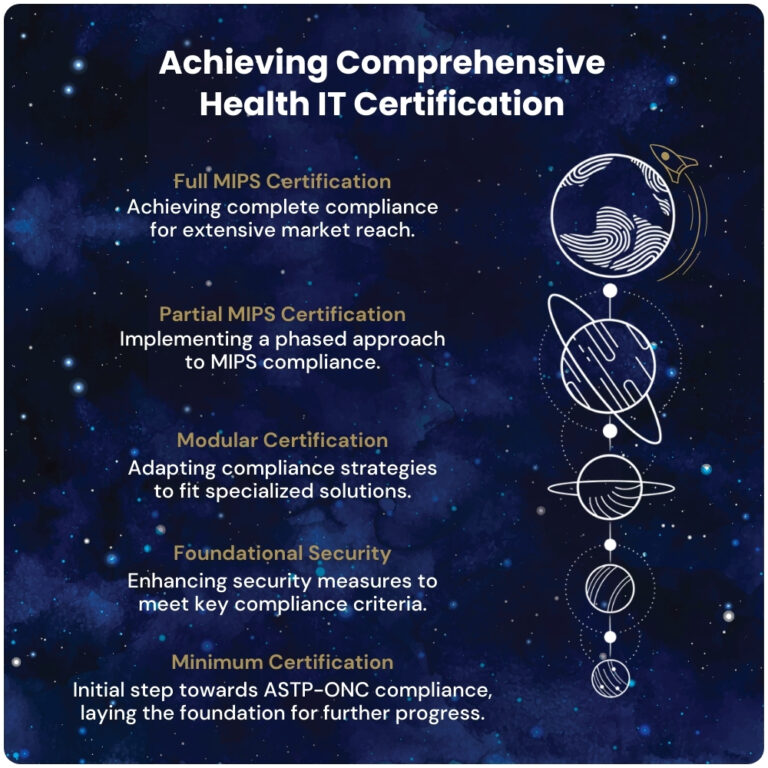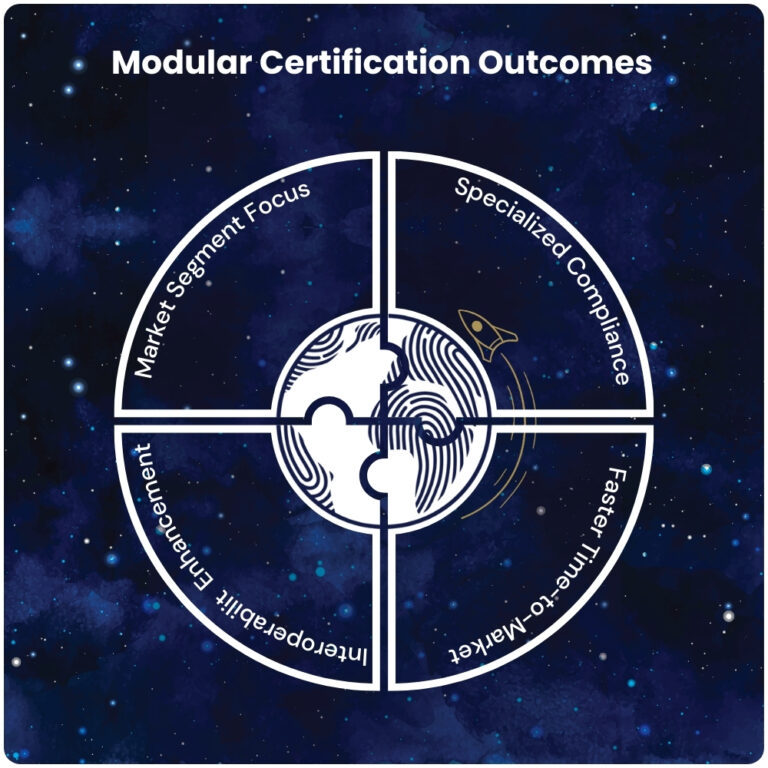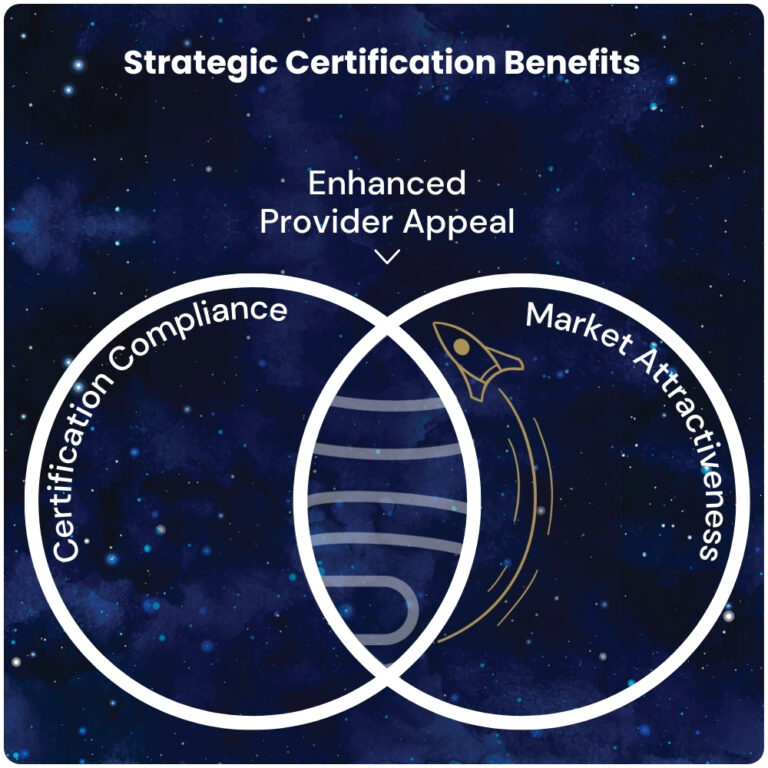Moving through the complex sector of Health IT certification under the ASTP-ONC programs is essential for developers aiming to establish credibility, meet regulatory standards, and effectively support provider-customers. As a trusted health IT certification partner, Drummond provides expert guidance and tailored solutions to help developers achieve compliance at every stage. From initial compliance to comprehensive certification for broader healthcare requirements, Drummond’s multi-level certification framework is designed to help you address a diverse set of needs. To highlight this process, we’ve outlined our available certification paths so you can understand which compliance routes best align with your goals, resources, and customer requirements.
Understanding Drummond’s Certification Framework
Health IT certification is not one-size-fits-all, and Drummond’s approach reflects that reality. Developers have unique product scopes, customer demands, and long-term goals, requiring a flexible certification strategy. Drummond’s multi-level framework is structured to meet these requirements, offering certification paths that range from basic compliance to full Merit-Based Incentive Payment System (MIPS) certification. For new entrants or established players, certification serves as a signal to provider-customers that the developer is committed to security, interoperability, and compliance.

To support developers, Drummond offers comprehensive ASTP-ONC support. These include tailoring certification paths to a developer’s specific needs, providing a clear roadmap for phased certification, and addressing unique challenges at each level. This structured, flexible support ensures that developers can navigate our process with confidence, regardless of their starting point or ultimate goals.
Minimum Certification – Getting Started with ASTP-ONC Compliance
Minimum Certification serves as the entry point for health IT developers beginning their compliance journey, it provides a cost-effective and straightforward path to establish initial credibility. By meeting basic requirements—with disclosures regarding development practices and implementation of a bulk export function for interoperability—developers can quickly gain visibility on the Certified Health IT Product List (CHPL). Minimum certification shows demonstrates your initial progress toward certification for stakeholders like investors, partners, and provider-customers.
Foundational Security Certification – Strengthening Compliance with Key Security Criteria
Foundational Security Certification builds upon Minimum Certification by incorporating essential security components that align with HIPAA requirements to ensure developers meet critical data protection standards. This certification typically includes six or more key capabilities—such as authentication, access control, encryption, and auditing—many of which are “dependent criteria” required for advanced ONC certification. Publicly listed on the CHPL, it provides visible validation of a developer’s commitment to security and enhances trust among provider-customers.
By achieving this certification, developers can address broader concerns in the healthcare industry (e.g. the need to protect sensitive patient information) while also demonstrating their SAAS solution employs compliant security controls. Foundational Security Certification is especially valuable for developers aiming to position their solutions as reliable and trustworthy in a competitive market where increasingly frequent data breaches and cybersecurity risks are a significant concern.
Incorporating security capabilities ensures readiness to support advanced interoperability criteria and CMS program requirements, such as the annual Security Risk Analysis (SRA) that providers must perform. Additionally, this certification shows a developer’s commitment to data protection by operationalizing HIPAA-driven security controls, helping them build stronger, longer-term relationships with provider-customers who prioritize secure, compliant solutions.
Modular Certification – Flexible Compliance for Specialized Solutions
Modular Certification is tailored for developers creating specialized health IT solutions that address specific functions within the ONC certification program, rather than those certifying full EHR systems. This approach enables compliance for targeted criteria such as FHIR capabilities, Decision Support, and Clinical Quality Measures, usually combined with Foundational Security Certification to ensure robust security compliance. By focusing on niche functionalities, developers reduce the burden of building a full EHR, allowing them to focus on their area of expertise while adapting to evolving ONC and CMS standards.
This certification is particularly beneficial for developers serving specific market segments, such as behavioral health, telehealth, or population health management, where specialized solutions are increasingly in demand. Modular Certification enables developers to meet these specialized needs without the overhead of creating a comprehensive EHR system, allowing for faster time-to-market and more focused resource allocation.
Moreover, this approach leverages interoperability by allowing providers to combine certified modular solutions with existing EHR systems to achieve broader compliance, such as MIPS requirements. This flexibility enhances the appeal of modular solutions, for providers aiming to optimize workflows and integrate multiple best-in-class solutions with their systems.

Partial/Phased Certification for MIPS – A Flexible Approach to MIPS Compliance
Partial/Phased Certification for MIPS provides a practical pathway for developers offering partial EHR functionality or those in early development stages, enabling them to certify select BaseEHR, Certified EHR Technology (CEHRT), MIPS criteria without committing to full certification immediately. This approach allows developers to strategically allocate resources, certifying only the capabilities necessary to meet initial market demands while laying the groundwork for future expansion.
By starting with partial compliance, developers can mitigate financial and operational risks, particularly when entering the market with limited resources or focusing on niche functionality. This strategy also enables developers to build trust with provider-customers by offering certified capabilities that address immediate needs, while maintaining a roadmap for future enhancements. Providers benefit from this phased approach by combining certified partial solutions with existing technologies to achieve full MIPS compliance, ensuring flexibility in their system configurations.
This phased approach also aligns compliance efforts with product development timelines, allowing developers to prioritize features that are most critical to their prospects and customers while incorporating relevant compliance capabilities that complement their overall product development plan. It is especially advantageous for new entrants or startups, providing a manageable pathway to establish credibility and secure market entry without overextending resources.
Throughout this process Drummond customers can integrate compliance needs into customized roadmaps, supported by ongoing expert guidance, helping developers address both short-term goals and long-term growth strategies. By partnering with Drummond, developers gain the confidence and clarity needed to navigate the regulatory process effectively, ensuring alignment with both their product vision and customer requirements.
Full Certification for MIPS – Complete Compliance for Comprehensive Market Reach
Full Certification for MIPS represents the most comprehensive path for developers, meeting all BaseEHR, CEHRT, and MIPS requirements to enable full compliance. This approach typically begins with prioritizing core BaseEHR criteria to secure a Certification ID on CHPL and progresses to additional CEHRT criteria and CMS measures to address diverse care settings.
Full certification maximizes your provider-customers’ eligibility for CMS incentives, making the developer’s solution more attractive while enabling broader market reach. It also ensures compliance with interoperability mandates and strengthens alignment with value-based care initiatives, helping providers optimize care delivery and reporting. Developers pursuing full certification often gain a competitive edge by offering solutions that support diverse healthcare settings, from primary care to specialty care, and meet the unique needs of larger healthcare organizations.
This path allows developers to create comprehensive solutions that integrate seamlessly into provider workflows, enhancing user satisfaction and driving adoption. Additionally, achieving full certification signals a long-term commitment to innovation and compliance, bolstering trust among provider-customers, investors, and partners.

Key Considerations and Insights
Selecting the most suitable compliance path requires careful evaluation of several key factors. Developers should assess their product’s scope—whether it is modular or a full EHR—and their market goals. Resource availability, including budget and development capacity, is crucial in deciding how to phase certification efforts. Aligning the certification path with both short-term priorities and long-term product roadmaps ensures that compliance efforts support broader business objectives. Immediate compliance needs, such as meeting foundational security or interoperability criteria, should be balanced against plans for future expansion.
Drummond offers tailored insights and strategic planning to guide developers through this decision-making process, ensuring alignment with their unique goals and customer requirements. With in-depth support at every stage, Drummond provides expert guidance on evolving ONC and CMS requirements, along with phased strategies for certification. This approach allows developers to incrementally integrate CMS measures and advanced features, all while staying focused on their customers’ most pressing needs. By fostering agility in the face of regulatory changes, Drummond ensures developers achieve long-term market relevance. For personalized guidance, schedule a consultation to explore the certification path that best supports your vision and success.
